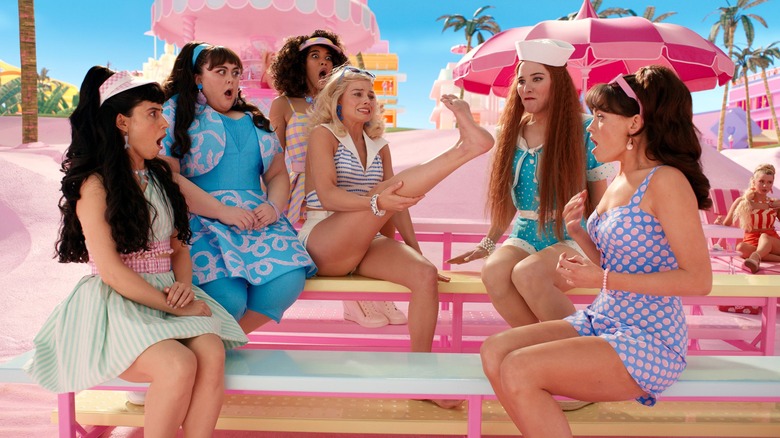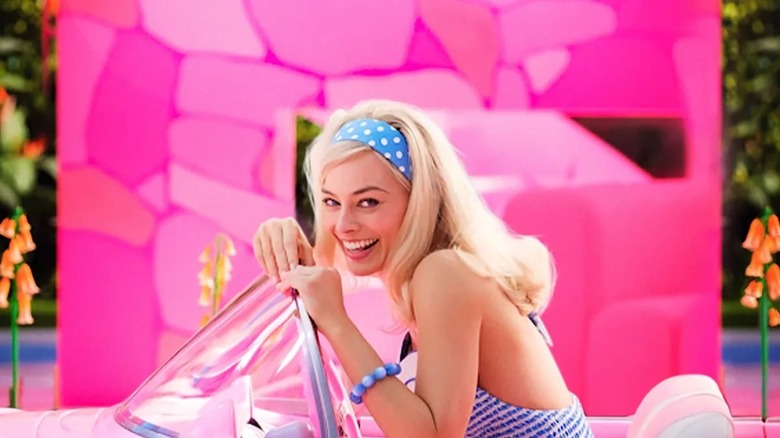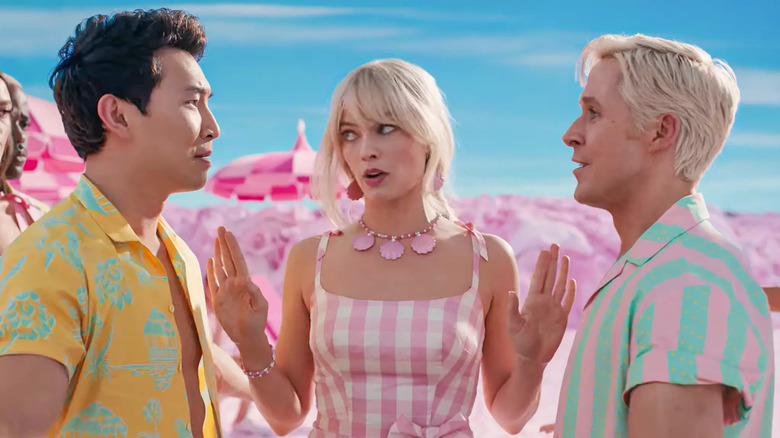Margot Robbie Wouldn't Have Made Barbie If She Was The Only One
With "The Flash" and "Indiana Jones and the Dial of Destiny" both disappointing at the box office, this summer's blockbuster season has been pitched as a clash between two titans of the 20th century. In one corner, you have Barbara Millicent Roberts, better known as Barbie, the doll who first hit our shelves in 1959 and became one of the best-loved and most iconic toys in the world, now receiving a live-action big screen outing in Greta Gerwig's "Barbie."
In the other corner, you have the "Father of the atomic bomb" and Destroyer of Worlds J. Robert Oppenheimer, the physicist who headed up the Manhattan Project and grappled with the prospect that his creation, which hastened the conclusion of the Second World War, could also end life on this planet. He gets the three-hour biopic treatment in Christopher Nolan's "Oppenheimer," with Cillian Murphy perfectly cast as the haunted genius.
Both films hit theaters on 21st July, a double-whammy that has become one of the most hotly anticipated cases of counter-programming in cinematic history and launched the phenomenon we now know as "Barbenheimer." Tom Cruise, who also has skin in the game this summer with "Mission Impossible – Dead Reckoning Part One" has weighed in on the issue, endorsing both films by stating he plans to see both movies on their opening weekend.
It's a fascinating clash between two eagerly awaited films that couldn't be much more different in terms of subject matter, tone, and style. Arguably, "Barbie" might not have generated the buzz it has without the presence of Margot Robbie in the lead role. She looks perfectly cast and is sure to elevate the film with her star quality, intelligence, and comic timing, but she has revealed that she might not have taken the part under other circumstances.
Barbie has been in the works for a long time
A "Barbie" movie has been in the works since 2009, with Amy Schumer later set to write and start in the lead role. She parted company due to creative differences with the studio and, after Anne Hathaway was briefly in the frame as a replacement, in stepped Margot Robbie. The twice Oscar-nominated actor sold the idea of her production company, LuckyChap Entertainment, finally realizing the long-gestating project. To this end, Robbie took the lead role and secured the considerable talent of Greta Gerwig to direct and co-write the screenplay with her partner Noah Baumbach.
When the main trailer for "Barbie" dropped back in May, it was a big event in its own right. The internet lit up with reaction and it revealed pretty much what you would expect for a Barbie movie written and helmed by one of the freshest feminist voices in Hollywood. Despite her enduring popularity, Barbie has become a divisive figure over the years. Some people hold her aloft as a feminist icon while others see her as an unrealistic role model and body image for young girls. That polarity is tackled head-on in the trailer:
"If you love Barbie, this film is for you... If you hate Barbie, this film is for you."
While the movie looks like a lot of fun, Gerwig also plants a flag for inclusivity and diversity and clearly isn't shy about taking a few pot-shots at misogyny and toxic masculinity, elements that have already drawn criticism from more right-leaning outlets for being too "woke." One issue that has prompted this kind of backlash is the casting of the film's multiple Barbies, a detail that was crucial for getting Robbie on board in the first place.
A move towards inclusivity sold Margot Robbie on Barbie
While Mattel takes pride in how many careers Barbie has enjoyed over the years and introduced Barbies of color as far back as 1980, the company had to make major changes in more recent years to tackle declining sales and stave off criticism regarding inclusivity and body positivity. An overhaul of the Barbie range began in 2016, which now boasts dolls with 35 skin tones and 9 body types, as well as Barbies with physical disabilities.
This positive change has carried over into the "Barbie" movie, reflected by the multiple versions of the character played by a diverse range of actors. Transgender actor Hari Nef is Doctor Barbie; Alexandra Shipp is Writer Barbie; and Issa Rae plays President Barbie, to name just a few. This was very important for Margot Robbie:
"If [Mattel] hadn't made that change to have a multiplicity of Barbies, I don't think I would have wanted to attempt to make a Barbie film... I don't think you should say, 'This is the one version of what Barbie is, and that's what women should aspire to be and look like and act like.'"
Robbie's star appeal and physical resemblance to the traditional Barbie is also a key selling point for the film, creating a link between the old-school iterations of the doll and the more diverse new range for people who might not be aware of the changes.
Negative reaction to the film's perceived "virtue signaling" from its right-leaning critics looks unlikely to harm the chances of "Barbie" at the box office as industry insiders reveal that it is tracking for a healthy $70 – $80 million opening weekend, potentially double that of "Oppenheimer." So inclusivity helped sell its star on the movie, and inclusivity might very well help it win the battle of "Barbenheimer."


